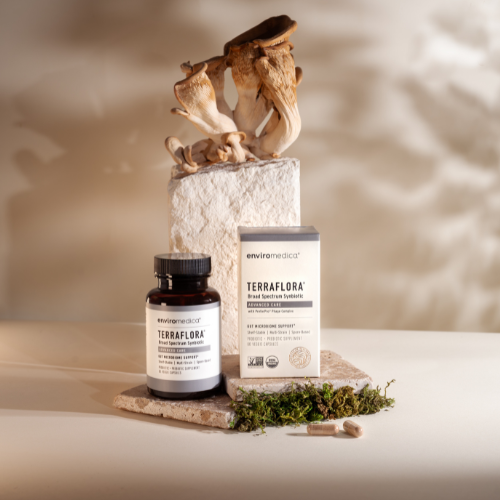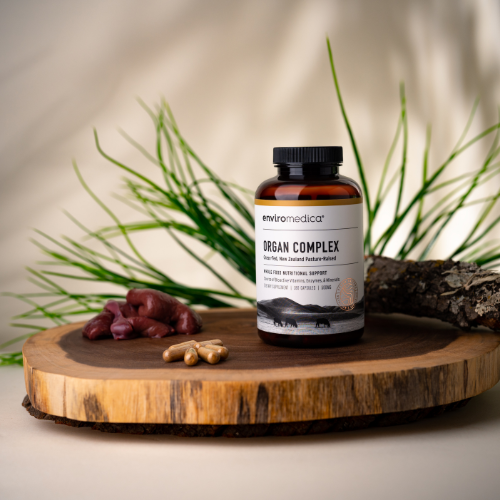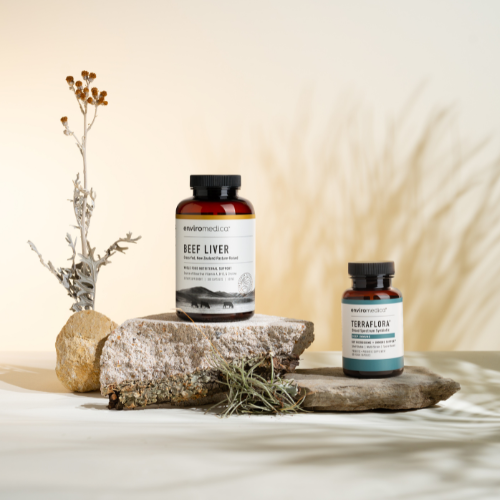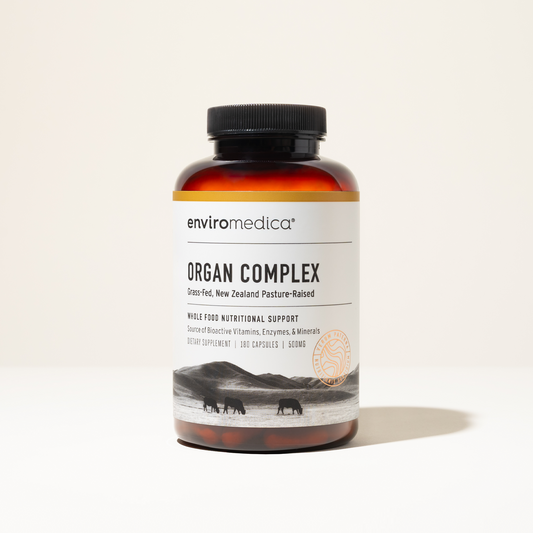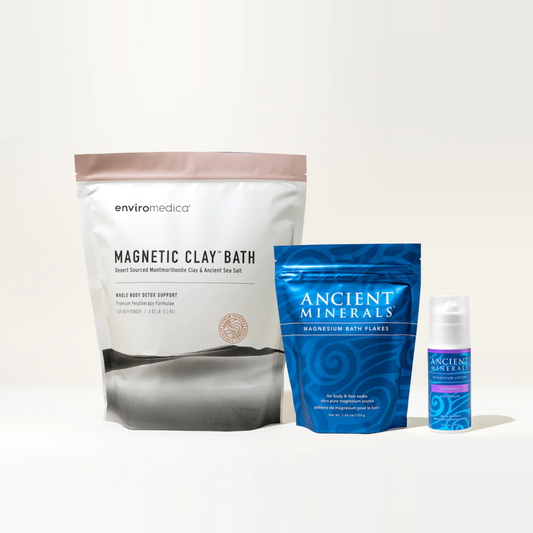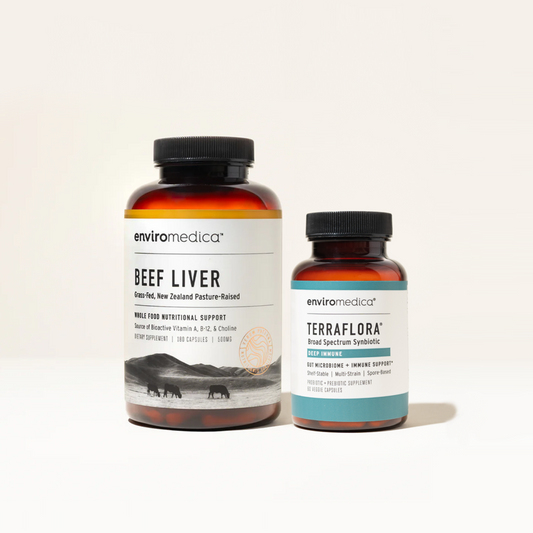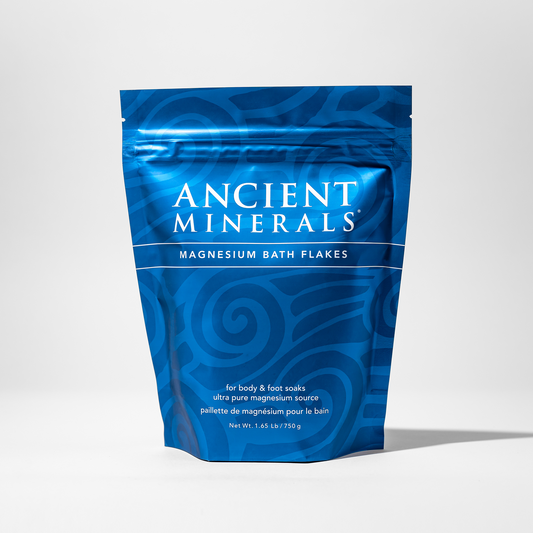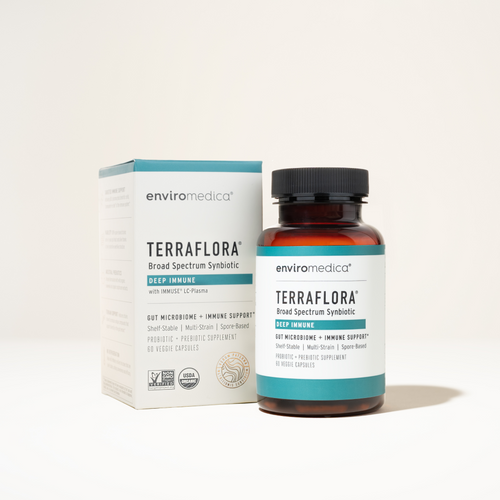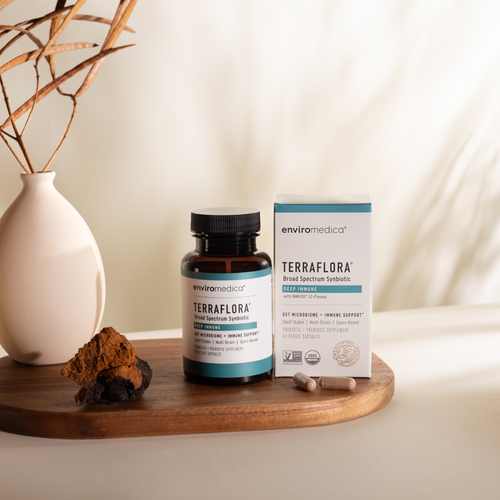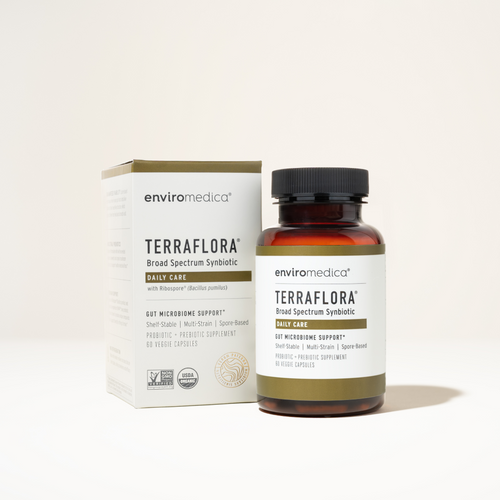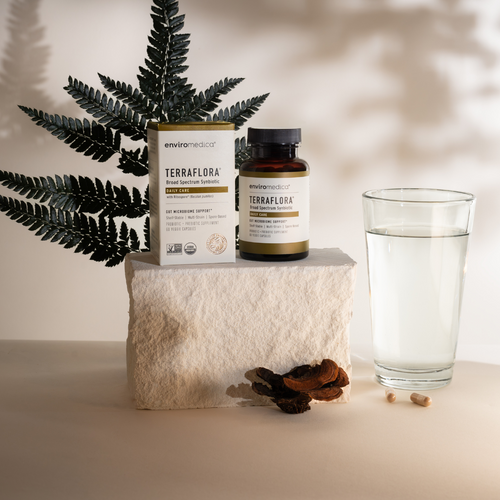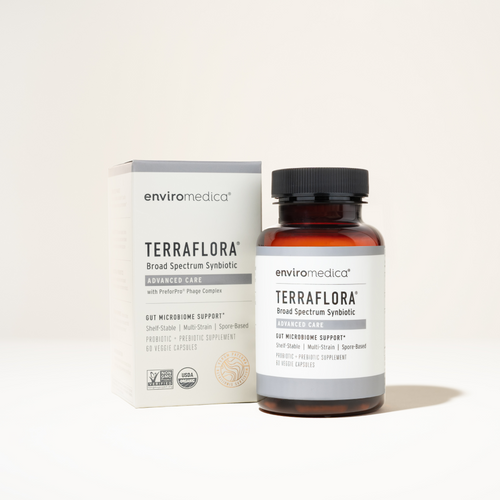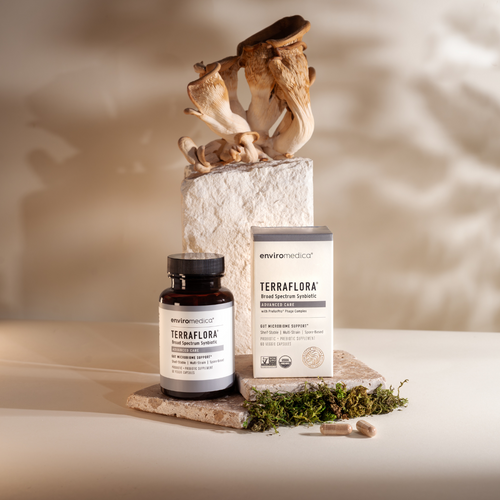You may be wondering, what is leaky gut exactly, what can I do to help repair my leaky gut, and how important a part do probiotics play in the process?
What does intestinal permeability or “leaky gut” mean?
Intestinal permeability or “leaky gut” is associated with inflammatory states, autoimmune issues, skin conditions, and bowel unease. Probiotics have been demonstrated to help prevent and counteract intestinal permeability, and stabilize the gut barrier. This gives us hope that we can bolster the health of our digestive system and gut lining by consuming fermented foods and supplementing with quality probiotics (or even better, use a Synbiotic which is a probiotic and prebiotic combination).
When we speak of a leaky gut, we are referring to leakages in the surface of the gut, known as the intestinal epithelium. The intestinal epithelium is a single-cell layer that is our largest and most important barrier against the external environment. It acts as a selectively permeable barrier, permitting the absorption of very small molecules of nutrients, electrolytes, and water while maintaining defenses against toxins, antigens, and bad bacteria. Regulation of intestinal permeability is one of the functions of the cells that line the intestine wall. There has recently been increasing recognition of an association between disrupted intestinal barrier function and the development of autoimmune conditions and inflammatory diseases.
If the mucosal lining of the intestinal wall becomes weak or has never fully developed, foreign invaders can easily pass through the intestinal wall and into the bloodstream.
Typically individuals with a leaky gut are sensitive to gluten, and possibly other proteins found in certain grains. However, there are many factors that can contribute to this mechanism, such as:
- Poor diet (processed foods, heavy grain consumption, and bad oils)
- Infections
- Toxins
- Too little stomach acid
- Deficiency of good bacteria (gut flora)
- Not being breastfed (breastfeeding promotes the closure of the inner luminal layer of the intestinal lining)
- Consumption of medications and anti-inflammatory drugs as well as alcohol use
- Stress and age can also contribute
Once these tight junctions become broken apart and larger proteins can pass through the walls of the gut, you have what is known as leaky gut. When the gut becomes more permeable, toxins from medications, bacteria, and undigested food particles, pass through the gut junctions and into the bloodstream. The immune system sees these “foreign invaders” as pathogens and begins an immune response or attack on them. This increases inflammation in the body, and inflammatory responses such as asthma, food allergies, food sensitivities or intolerances, environmental allergies, and autoimmune conditions.
What is the role probiotics have in healing leaky gut?
Over 80% of our immune system lies within the gut.
Our gut is home to approximately 100,000,000,000,000 (100 trillion) microorganisms. That’s such a big number our human brains can’t really comprehend it. One trillion dollar bills laid end-to-end would stretch from the earth to the sun – and back – with a lot of miles to spare. Do that 100 times and you start to get at least a vague idea of how much 100 trillion is.” – Chris Kresser
According to Isolauri, Salminen,1 (from the Nutrition, Allergy, Mucosal Immunology and Intestinal Microbiota Research group), immune regulation in the gut depends on the establishment of the healthy gut microbiota. The factors that contribute to leaky gut tend to produce inflammation and improper functioning of the mucous layer that protects the cells of the gut from damage. Medical experts suspect that probiotics’ role is to reduce these factors and therefore protect the gut.
Documented effects from probiotics have been reported for alleviating intestinal inflammation, normalization of gut mucosal dysfunction, and down-regulation of hypersensitivity reactions, thereby preferentially targeting allergic conditions with intestinal involvement. Probiotics mediate genes in the cells along the mucosal wall resulting in greater production of protective mucous. These gene expressions control the health of the mucous membrane by instructing the cells to protect themselves actively; probiotics ability to “communicate” with the cells in this way appears to be a big part of why their presence results in a healthier gut lining.
Probiotics also aid in the secretion of inflammatory mediators and development of the immune system. While the immune system is immature, and the risk of allergic disease is heightened, probiotics aid in breaking down bacteria and viruses, regulating of the secretion of inflammatory mediators, and direction of the development of the immune system during this critical period of life.
Probiotic supplementation facilitates healing for people with biliary obstruction
One example of probiotics’ role in maintaining healthy gut barrier function has been discovered among a group of people particularly vulnerable to intestinal permeability. Probiotic supplementation is also known to help protect people with bile duct blockages from developing a leaky gut. Bile helps with digestion and fat absorption, and also helps relieve the liver of waste. A blocked bile duct, also known as biliary obstruction, can be caused by a number of things including gallstones, inflammation of bile ducts, cysts, enlarged lymph nodes, and certain infections.
According to White, Hoper, Parks, Clements, Diamond and Bengmark,2, “biliary obstruction is associated with failure of intestinal barrier function. This allows for bacteria and other substances from the intestines to enter the circulation and initiate a systemic inflammatory response.” In this study, probiotic bacteria prevented the development of intestinal hyperpermeability associated with experimental biliary obstruction. This study provided insight to direct further work into the modulation of intestinal barrier function by probiotic bacteria.
Probiotic supplementation facilitates healing with intestinal permeability in children
Children are also susceptible to intestinal permeability. A recent study in Denmark explored children with autoimmune-related skin problems who also experienced increased symptoms of gastrointestinal abnormality. The researchers investigated the ability of probiotics to help stabilize and maintain healthy intestinal barrier function.
In this double-blinded placebo controlled, cross-over study3 carried out by Rosenfeldt, Benfeldt, Valerius, Paerragaard, and Michaelson (from the Department of Human Nutrition, The Royal Veterinary and Agricultural University, The University Clinic of Pediatrics, H-S Hvidovre Hospital, and the Department of Dermatology, Copenhagen, Denmark), probiotics were administered for 6 weeks to 41 children with dermatitis. Gastrointestinal symptoms were registered before and during treatment and small intestinal permeability was measured. The study suggested that probiotic supplementation may stabilize the intestinal barrier function and decrease gastrointestinal distress in similar children.
Probiotic research continues to prove beneficial in maintaining healthy gut function
Over 15 years ago probiotics were shown to have the ability to counteract increased intestinal permeability in rats. Since then, a lot of data has been gathered. What we know for sure, is that probiotics contribute to overall intestinal barrier function, and that maintaining healthy gut flora is essential. According to Ahrne and Hagslatt, 4 “Maintaining paracellular permeability in the gut at a normal level is a very central function that is compromised in many disease situations. Impaired gut barrier function may take days to restore and could eventually lead to an increased translocation of intestinal bacteria into the body. Under these circumstances the gut has been called “the undrained abscess.”
When struggling with issues related to gut permeability, it is important to include fermented foods in the diet, as well as take a quality probiotic supplement. This will help to both establish and sustain a healthy gut microbiota.
References
- 1. Wikipedia. (2015). Wikimedia Foundation, n.d. Web.
- 2. The Human Microbiome. (2015). Human Microbiome RSS, n.d. Web.
- 3. Overweight and Obesity Statistics (2012). Overweight and Obesity StatisticsWeb.
- 4. Gunnars, Kris (2013). Debunking the Calorie Myth — Why.RSS 20. N.p.
- 5. Barlow, G. M., Yu, A., & Mathur, R. (2015). Role of the Gut Microbiome in Obesity and Diabetes Mellitus.Nutrition in Clinical Practice, 0884533615609896–. doi:10.1177/0884533615609896
- 6. DiBaise, J. K., Zhang, H., Crowell, M. D., Krajmalnik-Brown, R., Decker, G. A., & Rittmann, B. E. (2008). Gut Microbiota and Its Possible Relationship With Obesity.Mayo Clinic Proceedings, 83(4), 460–469. doi:10.4065/83.4.460
- 7. Caricilli, A., & Saad, M. (2013). The Role of Gut Microbiota on Insulin Resistance.Nutrients, 5(3), 829–851. doi:10.3390/nu5030829
- 8. Hong, H. A., Duc, L. H., & Cutting, S. M. (2005). The Role of Gut Microbiota on Insulin Resistance.Nutrients, 5(3), 829–851. doi:10.3390/nu5030829
- 9. Cutting, S. M. (2011). Food MicrobiologyBacillus probiotics. 28(2), 214–20. doi:10.1016/j.fm.2010.03.007
